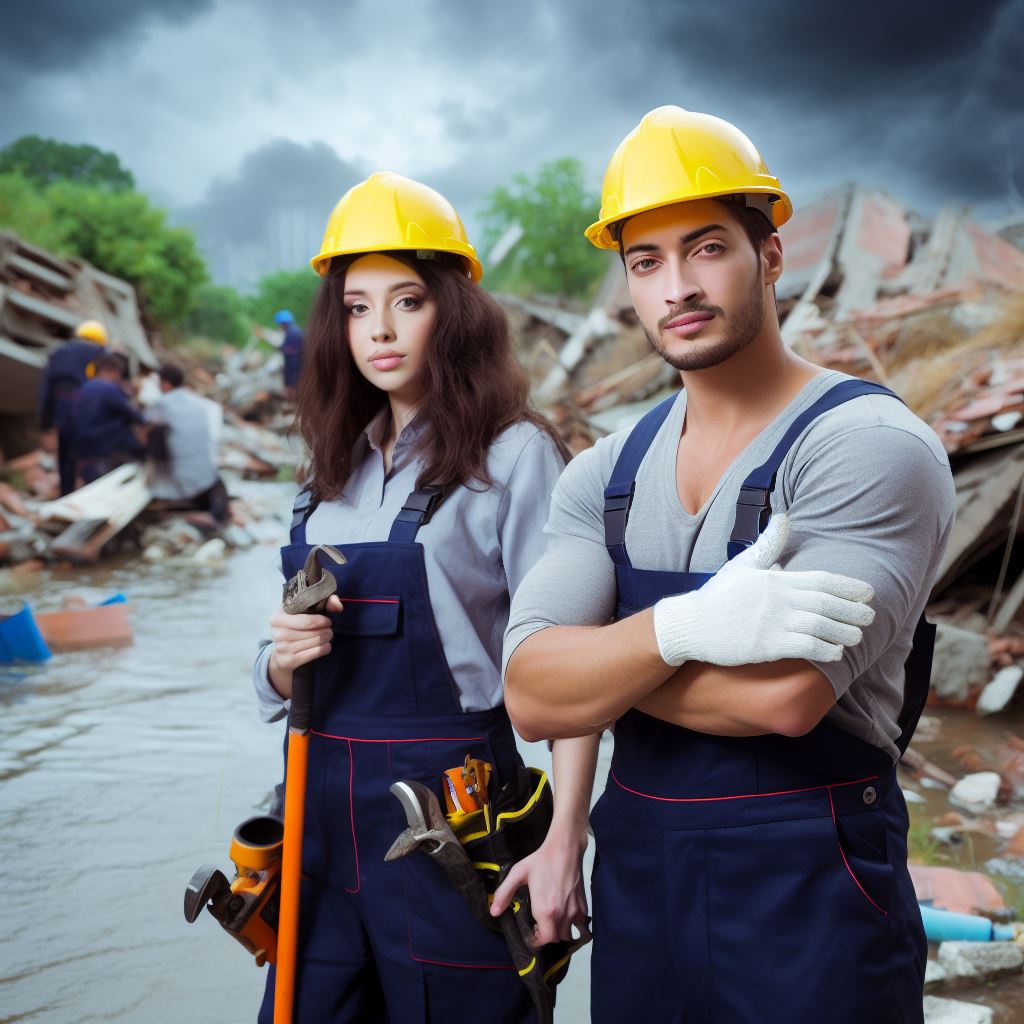Introduction
Welcome to the latest blogpost in our “Real Stories” series, where we delve into the lives of individuals in various professions.
Today, we focus on a critical yet often overlooked profession – the American plumber.
Understanding different professions and the hard work involved is essential for appreciating the diverse tapestry of our society.
A Glimpse into the Lives of American Plumbers
From the first ring of the alarm, the American plumber kicks off the day with determination.
Wrench in hand and a can-do attitude, they fix plumbing issues, impacting our lives significantly.
At every door knock, the plumber is ready to face challenges. Leaky faucets, clogged drains, or broken pipes, no problem is too big or small for them.
Expertise saves us from disasters, ensuring smooth home functioning. Pulling up to the first task, the plumber wears protective gear.
Crawling under sinks or wading through water, they’re prepared for any situation.
The job’s physical demands are strenuous, but commitment never wavers.
Every day brings opportunities to learn and grow.
Effective communication is vital, ensuring mutual understanding of problems and proposed solutions.
Plumbers possess problem-solving abilities beyond technical expertise.
They analyze complex systems, troubleshoot, and devise innovative solutions.
Combining knowledge with a creative mindset, they ensure the best outcomes.
As the sun sets, reflecting on the day’s achievements, the plumber finds satisfaction in restoring household functionality.
The life of an American plumber is challenging, but their dedication profoundly impacts us.
Gaining insight into their world fosters a deeper appreciation for their profession and others contributing to society.
Let’s celebrate these unsung heroes, recognizing their vital role in keeping our homes and businesses running smoothly.
Overview of the Plumbing Profession
Plumbers, crucial for daily life, install, repair, and maintain water and drainage systems in buildings, ensuring clean water and sanitation.
Residential plumbers focus on homes, handling tasks like pipe and fixture installation, addressing leaks, and fixing clogs.
Transform Your Career Today
Unlock a personalized career strategy that drives real results. Get tailored advice and a roadmap designed just for you.
Start NowCommercial plumbing serves larger structures like offices and hospitals, requiring expertise in advanced installations and repairs.
Industrial plumbers handle challenges on industrial sites, collaborating with professionals to ensure safety and efficiency.
Service and repair plumbing involves troubleshooting, fixing issues, and providing maintenance for residential and commercial customers.
In construction, plumbers work with contractors to design and install systems, determining pipe layouts and connecting fixtures.
An American plumber’s day involves diverse tasks, from reviewing orders to visiting sites and working on new construction projects.
Using tools like wrenches and pipe cutters, they handle tasks efficiently, adapting to unexpected challenges and coordinating with other tradespeople.
Beyond technical skills, plumbers need excellent communication to interact with clients, explaining issues and providing recommendations clearly.
In summary, plumbing is vital, impacting daily life from residential to commercial settings, requiring expertise, problem-solving, and a commitment to service.
Read: Celebrating Women and Diversity in the US Plumbing Field
Educational Requirements and Training
Vocational Training or Apprenticeships
Becoming a plumber requires practical experience and the first step is completing vocational training or apprenticeships.
Importance of Hands-on Experience
Hands-on experience is crucial in the plumbing field as it allows plumbers to develop necessary skills and expertise.
Apprenticeships
Apprenticeships provide aspiring plumbers with a combination of classroom instruction and on-the-job training.
Vocational Training
Vocational schools offer plumbing programs that provide comprehensive training, including theoretical knowledge and practical skills.
Certifications and Licenses
Plumbers may also need to obtain certifications or licenses to legally practice their profession.
State Licenses
In most states, plumbers are required to hold a state license, which involves passing an exam and meeting specific requirements.
Journeyman Plumber Certification
Obtaining a journeyman plumber certification signifies a higher level of expertise and can lead to better job opportunities.
Master Plumber Certification
Master plumber certification is the highest level of achievement in the plumbing industry and requires extensive experience and knowledge.
Specialized Certifications
Plumbers can also pursue specialized certifications in areas such as pipefitting, gas fitting, or backflow prevention.
Becoming a plumber involves completing vocational training or apprenticeships to gain hands-on experience.
Plumbers may also need to obtain certifications and licenses to practice legally.
Transform Your Career Today
Unlock a personalized career strategy that drives real results. Get tailored advice and a roadmap designed just for you.
Start NowRead: US Plumber’s Role in Water Conservation and Sustainability
A Typical Day in the Life of an American Plumber
Each day in the life of an American plumber can be different, depending on the specific jobs and clients they have.
It is a dynamic profession that requires adaptability and a variety of skills.
The Early Morning Routine
Every day starts with a routine check and organization of the work schedule.
Plumbers need to review the appointments and jobs lined up for the day, ensuring they have the necessary tools and materials for each task.
Handling Different Tasks
Throughout the day, plumbers handle a wide range of tasks.
These can include installations, repairs, and maintenance work.
They may be called to install new plumbing systems in residential or commercial buildings or fix leaks and clogs in existing ones.
Plumbers often encounter unexpected challenges that require problem-solving skills.
They need to analyze situations and come up with creative solutions to fix complex plumbing issues.
This requires experience, technical knowledge, and the ability to think on their feet.
The Importance of Effective Communication
Effective communication is vital in the plumbing profession.
Plumbers need to understand their clients’ requirements and concerns, and also communicate clearly with their colleagues.
They must be able to explain complex concepts and technical details in a way that clients can understand.
Building strong relationships with clients is crucial.
Plumbers need to listen attentively to their clients’ needs and provide honest advice and recommendations.
Clear communication helps ensure that clients feel informed and confident in the plumber’s abilities.
Additionally, collaboration with colleagues is essential. Plumbers often work in teams, especially on larger projects.
Communication between team members is necessary to coordinate tasks, share information, and ensure the overall success of the project.
A day in the life of an American plumber is a busy and dynamic one.
Transform Your Career Today
Unlock a personalized career strategy that drives real results. Get tailored advice and a roadmap designed just for you.
Start NowIt involves checking schedules, handling a variety of tasks, solving challenges, and maintaining effective communication with clients and colleagues.
Plumbers play a vital role in ensuring the proper functioning and safety of plumbing systems, and their expertise is highly valued in society.
Read: Demand Forecast: The Future of Plumbing Jobs in the USA

Work Environment
When it comes to the work environment of a plumber, there are various settings they might find themselves in.
From residential homes to commercial buildings and construction sites, each presents different challenges and demands.
Residential Homes
- Plumbers often work in residential homes, addressing issues such as leaky pipes and faulty water heaters.
- They interact with homeowners, discussing plumbing problems, assessing needs, and providing solutions.
- The work may involve repairing or replacing fixtures, installing new plumbing systems, or unclogging drains.
- Collaboration with homeowners and the ability to communicate effectively are essential in this environment.
- Residential homes can have tight spaces, requiring plumbers to work in confined areas.
Commercial Buildings
- Commercial buildings, such as offices, hotels, and restaurants, also require the services of plumbers.
- Plumbers handle larger-scale projects, including the installation of complex plumbing systems.
- They may need to work with blueprints and collaborate with architects, engineers, and contractors.
- Maintenance and repairs in commercial buildings can be extensive due to the high demand on plumbing systems.
- Plumbers must be adaptable and knowledgeable about various fixtures and systems found in commercial settings.
Construction Sites
- Plumbers play a crucial role in construction sites, ensuring the plumbing infrastructure is properly installed.
- They work with other tradespeople, such as electricians and carpenters, to coordinate the building process.
- Installing pipelines, connecting fixtures, and testing systems to ensure functionality are typical tasks.
- Construction sites can be hazardous, with the potential for falling objects or working at heights.
- Plumbers must follow safety regulations and wear protective gear like helmets and steel-toed boots.
In addition to the different work environments, being a plumber requires physical fitness due to the physical demands of the job.
Physical Demands
- Plumbers need to lift heavy objects, such as pipes and water heaters, requiring strength and agility.
- They often need to work in awkward positions, bending, kneeling, and crawling to access plumbing systems.
- Operating tools and equipment, such as wrenches and blowtorches, requires dexterity and fine motor skills.
- Endurance is necessary, as plumbers may spend long hours on their feet, working in challenging conditions.
However, the job of a plumber also comes with potential hazards that must be considered for the safety of both the plumber and the clients.
Potential Hazards and Safety Precautions
- Exposure to harmful substances like sewage, chemicals, and asbestos is a hazard plumbers face.
- They must wear protective clothing and follow strict safety procedures when dealing with these substances.
- Working in confined spaces presents risks of suffocation, and proper ventilation is crucial in such situations.
- Plumbers may encounter sharp tools or objects, increasing the risk of cuts or other injuries.
- Adhering to safety regulations, using personal protective equipment, and staying vigilant are vital.
In essence, plumbers encounter diverse work environments, ranging from residential homes to commercial buildings and construction sites.
They need physical fitness to meet the demands of the job while considering potential hazards and taking necessary safety precautions.
Read: Plumbing Innovations: Modern Trends Taking the US By Storm
See Related Content: Crafting the Future: Carpenter Apprenticeships in the US
Explore Further: The Role of Unions in the US Construction Worker’s Career
Tools and Equipment Used
- Pipe Wrench: Used to tighten and loosen pipes, fittings, and other plumbing connections.
- Plumbing Snake: A long, flexible auger used to remove clogs from drains and pipes.
- Adjustable Wrench: Used to tighten or loosen nuts and bolts on various plumbing fixtures.
- Plunger: A suction device used to unclog drains by creating pressure and dislodging blockages.
- Trench Shovel: Used to dig trenches for installing or repairing underground plumbing lines.
- Pipe Cutter: Enables the plumber to cut pipes to the desired length, ensuring a proper fit.
- Pipe Threader: Used to create threads on pipe ends, allowing for secure connections.
- Tubing Cutter: Perfect for cutting plastic or copper tubing with precision and ease.
- Pliers: Essential for gripping and turning small objects, such as nuts or bolts.
- Propane Torch: Utilized for soldering and joining copper pipes together effectively.
The Importance of Proper Maintenance and Understanding Different Plumbing Technologies
Proper maintenance of plumbing tools and equipment is crucial for the efficient functioning of a plumber’s daily tasks.
Regular cleaning, lubricating, and replacing parts ensure that the tools remain in good working condition and extend their lifespan.
Understanding different plumbing technologies is equally important as it allows plumbers to keep up with industry advancements and provide better services to their clients.
With new materials, techniques, and equipment constantly emerging, staying updated ensures quality work and customer satisfaction.
For example, knowledge of modern pipe materials like PEX (cross-linked polyethylene) and PVC (polyvinyl chloride) is essential.
Plumbers must understand their advantages, disadvantages, and proper installation techniques to ensure longevity and prevent potential leaks or failures.
Additionally, familiarity with advanced plumbing technologies, such as video pipe inspection, hydro jetting, and trenchless pipe repair, enables plumbers to diagnose and fix issues more efficiently.
Video pipe inspection helps locate hidden problems within pipes, while hydro jetting uses pressurized water to clean out stubborn clogs.
Trenchless pipe repair eliminates the need for extensive digging, minimizing disruption to properties and saving time and money.
Transform Your Career Today
Unlock a personalized career strategy that drives real results. Get tailored advice and a roadmap designed just for you.
Start NowMoreover, staying knowledgeable about energy-efficient fixtures and water conservation techniques enables plumbers to provide eco-friendly solutions to their customers.
This includes recommending low-flow toilets, faucets, and showerheads, as well as suggesting ways to reduce water waste and improve overall sustainability.
Essentially, a plumber relies on various tools and equipment every day to perform their duties effectively.
Proper maintenance of these tools and staying updated with the latest plumbing technologies are vital for providing high-quality services and meeting customer expectations.
Continuous learning and adaptation to new techniques ensure that plumbers can tackle any plumbing issue efficiently while minimizing disruptions and delivering long-lasting results.
Learn More: Training and Certifications: Upgrading Skills in US Construction
Job Outlook and Advancement Opportunities
The demand for plumbers is currently high, with a projected growth rate of 14% in the next decade.
As the population continues to expand, the need for plumbing services will also increase.
Plumbers are essential in residential, commercial, and industrial settings, ensuring proper water supply and drainage systems.
Advancement in the plumbing industry can be achieved through various career paths.
One option is to specialize in a particular area, such as pipefitting, steamfitting, or sprinkler fitting.
By honing their skills and knowledge in one specific field, plumbers can become experts in their chosen area.
Specialization not only allows plumbers to expand their expertise but also opens up new opportunities for higher-paying jobs.
Another pathway for advancement is to start a plumbing business.
Entrepreneurial plumbers can establish their own companies, offering their services to a wide range of clients.
Running a business brings the opportunity to hire and manage a team of plumbers, expanding the reach and impact of the enterprise.
Plumbing businesses can further diversify by providing additional services, such as HVAC installation or bathroom remodeling.
With consistent growth and customer satisfaction, a plumbing business has the potential to become a trusted local brand.
Advancement in the plumbing industry also includes obtaining relevant certifications and licenses.
These credentials demonstrate a plumber’s commitment to professionalism and adherence to industry standards.
Transform Your Career Today
Unlock a personalized career strategy that drives real results. Get tailored advice and a roadmap designed just for you.
Start NowMaster plumber licenses, for example, can be achieved by meeting specific experience and education requirements.
Becoming a master plumber not only boosts credibility but also increases job prospects and earning potential.
The plumbing industry offers excellent job stability and security.
Plumbers will always be in demand, as the need for safe and efficient water systems is vital in every community.
Conclusion
The day in the life of an American plumber is far from mundane. It is a profession that requires skill, knowledge, and dedication.
Plumbers play a crucial role in ensuring that our homes and businesses have functioning plumbing systems.
Throughout this blog post, we have explored the challenges and rewards of being a plumber.
From dealing with emergencies to problem-solving complex issues, plumbers have to be adaptable and quick-thinking.
They work tirelessly to provide efficient and reliable plumbing services.
It is important to appreciate the hard work and professionalism that plumbers bring to their jobs.
They are often unsung heroes, working behind the scenes to keep our lives comfortable and hygienic.
Next time you see a plumber, take a moment to acknowledge their contribution.
This blog post also highlights the broader theme of diverse professions and the dedication individuals put into their work.
Plumbers are just one example of the countless professionals who work diligently to make our society function smoothly.
Every profession has its own unique challenges and rewards.
As a closing thought, I encourage readers to explore the real-life stories of other American professionals.
Understanding different professions can give us a deeper appreciation for the variety of skills and talents that exist.
So, let’s take the time to learn about the amazing work that professionals in various industries do every day.
Let us recognize and value the hard work of plumbers and professionals from different fields, and continue to learn about their stories and experiences.
[E-Books for Sale]
The Big Book of 500 High-Paying Jobs in America: Unlock Your Earning Potential
$19.99 • 500 High-Paying Jobs • 330 pages
Explore 500 high-paying jobs in America and learn how to boost your career, earn more, and achieve success!
See All 500 High-Paying Jobs of this E-Book
1001 Professions Without a Degree: High-Paying American Jobs You Can Start Now
$19.99 • 1001 Professions Without a Degree • 174 pages
Discover 1001 high-paying jobs without a degree! Unlock career tips, skills, and success strategies for just $19.99!




